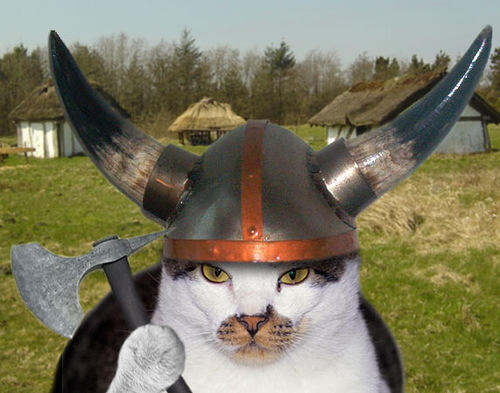Viking and Pirate Black Cats May 8, 2011
Author: Beach Combing | in : Medieval, Modern , trackback***This post is dedicated to BAY and Raspberry Beret***
Beachcombing would be the first to admit that he has been overdoing it with cats recently: this despite not even particularly caring for moggies, being much more a dog and tortoise person. But an email from BAY on Beach’s black cats – unlucky for some piece has provoked him to one more May kitty post:
The reason I heard, years ago, for black cats being unlucky in southern Europe and other places (inc. USA ) [but not in Britain], was that the Vikings, when they ransacked, pillaged, etc. a village would leave a black cat behind, it being a good-luck omen for them (but therefore bad for everyone else, of course). The British Isles were pretty much Viking territories, or parts of them were, so, hence black cats were seen as good luck omens… I was told this years ago by an Italian I met. It sounds reasonable, but I have no idea if it’s true.
Beachcombing also had an email from Raspberry Beret saying almost exactly the same thing about pirates in the early modern period.
Beachcombing can shed at least a little light on this belief. There must though be a lot more information out there: drbeachcombing AT yahoo DOT com
First, Vikings and pirates (and of course when away from home Vikings were pirates) had access to cats. Vikings believed that Freya’s chariot was pulled by cats – colour unspecified. And any intelligent sea captain would make sure that he had a mouser on board his vessel to keep vermin to a minimum.
But where does the legend – for such it surely is – of pirates/Vikings leaving black cats behind come from? One work on the Barbary Coast pirates seems to give an answer:
(42) ‘To this day some southern Italians maintain the prejudice against black cats in their part of the country comes from the old belief that these were corsairs’ cats – their familiars actually – left behind either accidentally or as spies when the raiders sailed away.’
Surely the origin of this belief – and not we are in Italy again – is the idea, as our author says, that the cats were diabolical ‘spies’ and this is not the origin of the superstition but just a reflex of the notion that the black cat belonged to the devil.
Poor Italy was the principal hunting ground of the Muslim Corsairs through several centuries and there are still memories in Sicilian folklore of the terror they brought with them. Pity help any black felines who happened to be in an area after the Corsairs had done stealing villagers!
Beachcombing took his life in his hands and went searching for recent evidence of this Italian ‘prejudice’ on the net. There are many examples: though most include rationalizations such as the following taken, almost at random, from a Yahoo Answers board.
‘I seem to remember that the Saracen pirates had black cats on their ships (black because they were more common in the homelands) to stop mice eating the pirate’s provisions. When the pirates arrived in the area they wanted to sack the first to get to a village were the cats that were seen as symbols of bad luck for what they heralded. I am not certain of this theory but it seems interesting to me!’
(Mi sembra di ricordare ce i pirati saraceni avessero sulle navi dei gatti neri (perché erano i più diffusi nelle zone di provenienza) per impedire ai topi di mangiare le provviste, quando i pirati arrivavano per i loro saccheggi i primi ad arrivare nei villaggi erano i gatti da allora visti come simbolo di malasorte per ciò che conseguiva al loro arrivo. Non sono sicura della verità di questa teoria ma mi sembra interessante!’)
Surely this is the origin of the story that BAY and Raspberry Beret ran into? Of course, black cats are not more common in the Arab world. Again what we have here, is a popular theme: namely that the Muslim Corsairs were the Devil’s sailors.
It would be interesting to establish when the earliest reference to black cats as unlucky creatures appears. Presumably there is nothing pre-Christian from Europe? But then black cats are often reviled in the non-Christian world too.



